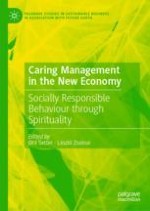This edited book frames a new ethos of management that cares for society, future generations and nature whilst also serving the interests of business and the wider community. Employing the practical wisdom of faith traditions, the chapters develop the use of spirituality as a resource for creating business models that take pressing social problems – such as quality of life at work, over-consumption, environmental degradation and climate change – into account. Spanning entrepreneurship, leadership, management education and business models, the chapters in this book aim to develop a spiritually-based caring model of management to face the challenges and reality of the 21st century.
